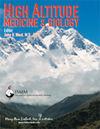高空回肠
IF 1.6
4区 医学
Q4 BIOPHYSICS
High altitude medicine & biology
Pub Date : 2024-12-01
Epub Date: 2024-07-03
DOI:10.1089/ham.2023.0132
引用次数: 0
摘要
自身免疫性重症肌无力(MG)通常是由于产生了阻断乙酰胆碱受体的抗体而引起的一种疾病。直到最近,胃肠道(GI)症状仍被认为是重症肌无力的罕见症状,但现在却被认为是一种早期识别工具。本文介绍的一个病例研究说明了重症肌无力的胃肠道症状因高原低气压而加重。这说明有必要及早识别 MG 患者的消化道症状,高海拔地区的医疗人员也有必要了解 MG 的这些表现。本文章由计算机程序翻译,如有差异,请以英文原文为准。
Ileus at Altitude.
Ebert-Santos, Christine, and Ana Campos. Ileus at altitude. High Alt Med Biol. 25:342-344, 2024.-Autoimmune myasthenia gravis (MG) is a condition commonly caused by the production of antibodies that block acetylcholine receptors. Until recently, gastrointestinal (GI) symptoms were considered rare in myasthenia gravis, but are now being proposed as an early identification tool. Presented here is a case study that exemplifies GI symptoms in MG, exacerbated by low barometric pressure at altitude. This illustrates the need to identify GI symptoms earlier in MG patients, as well as the need for providers at high altitude to be aware of these manifestations of MG.
求助全文
通过发布文献求助,成功后即可免费获取论文全文。
去求助
来源期刊

High altitude medicine & biology
医学-公共卫生、环境卫生与职业卫生
CiteScore
3.80
自引率
9.50%
发文量
44
审稿时长
>12 weeks
期刊介绍:
High Altitude Medicine & Biology is the only peer-reviewed journal covering the medical and biological issues that impact human life at high altitudes. The Journal delivers critical findings on the impact of high altitude on lung and heart disease, appetite and weight loss, pulmonary and cerebral edema, hypertension, dehydration, infertility, and other diseases. It covers the full spectrum of high altitude life sciences from pathology to human and animal ecology.
 求助内容:
求助内容: 应助结果提醒方式:
应助结果提醒方式:


